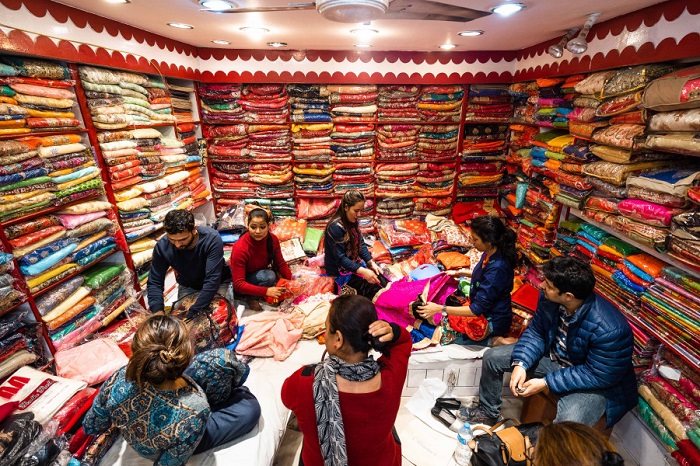Last year, inbound containers were held up at the northern border point due to Covid-19 restrictions, and they arrived too late for the festival shopping spree.

Nearly 80 percent of the readymade garments sold in Kathmandu Valley are imported from China. The rest come from India, Bangladesh, Thailand, Vietnam and Indonesia.
Nepali traders have started placing early bird orders for merchandise from China to prevent a repeat of last year's fiasco, when they were left without inventory during the peak shopping season due to delayed shipments, insiders said.
Last year, hundreds of inbound containers were held up at the northern border point due to Covid-19 restrictions in China, with the result that they missed the Dashain shopping spree. Traders said that goods ordered for the summer season arrived in the winter and vice versa, resulting in big losses.
Nearly 2,000 containers holding clothes, shoes, cosmetics, electronics and industrial raw materials were stuck at the Chinese border, and most of them arrived in the country after the Dashain festival had ended.
“Traders are now ordering clothing items by looking at online catalogue photos and negotiating prices by messaging apps, particularly with Chinese traders. The trade gateways in China continue to be restricted for Nepali traders,” Naresh Katuwal, president of the Nepal National Traders' Federation, told the Post.
China, Nepal’s major trading partner in clothing items, has denied entry to Nepalis and even their citizens who have been stranded here since February.
“Nepali traders will not be able to go to China this year too due to restrictions, but as they have placed orders well in advance, we expect that the market will not see a shortage of fashionable goods,” said Katuwal. But, according to him, prices have risen this festive season.
Ghatasthapana, the first day of Vijaya Dashami, falls on October 7 this year.
Nearly 80 percent of the readymade garments sold in Kathmandu Valley are imported from China. The rest come from India, Bangladesh, Thailand, Vietnam and Indonesia. Traders said that imports fell to almost zero last year.
According to the Central Bureau of Statistics, in the last fiscal year ended mid-July, Nepal’s final consumption expenditure at current prices amounted to Rs3.98 trillion, representing 93.38 percent of the gross domestic product.
In national accounts, final consumption expenditure is expenditure on goods and services. This consumption is significantly higher in September and October with the festival season.
“The Covid-19 situation is still uncertain. There is political uncertainty too. So traders started ordering goods earlier than usual. We expect the clothing items that will be in demand during the festival to arrive within three weeks,” Katuwal said.
Among many kinds of products, apparels are the fastest selling items as people customarily wear new clothes during the two-week-long Dashain festival.
According to the import data of the Trade and Export Promotion Centre, the country imported apparels and clothing accessories worth Rs30 billion in the last fiscal year 2020-21, up 25 percent year-on-year, despite Covid restrictions.
Rupesh Pandey, chairman and managing director of the RP Group that deals in international brands of clothing, footwear and accessories, said that observing the market, they had reduced import orders by 50 percent. “The goods that we have ordered will arrive within two weeks.”
Market confidence has still not picked up, as a result, orders for new goods are almost half compared to last year, Pandey said, who is importing clothing from India, London, Singapore and Taiwan.
Katuwal added that shipments had not arrived as per their expectation due to the strict restriction at the northern border points.
Ram Hari Karki, senior vice-president of the Nepal Trans Himalayan Border Commerce Association, said that as Nepali traders are not getting visas to travel to China and purchase goods, there are chances that clothing items might not be up to date in terms of fashion and designs that customers are looking for.
Two key trade gateways from China—Rasuwagadhi and Tatopani—are not fully functional.
“The Rasuwagadhi point is almost closed while six to seven cargo freights are allowed daily from Tatopani. The road to Kathmandu is also not in good condition,” Karki said.
"With the rise in freight charges globally and hike in local transportation costs and customs duty, retail prices of clothing items are expected to be around 35 percent higher this festive season," he added.
Traders said that Covid-19 had changed consumption patterns as people are focusing more on food items than on other stuff; and also due to virus fears, people tend to celebrate the festival at home.
Katuwal said that clothing sales during last year’s festival were not as good as expected due to delayed arrival of goods and falling consumer income.
“The Dashain market will definitely not be as it used to be before the pandemic; but as people manage to celebrate the festival with the budget they have, we are expecting an average amount of business,” he said.
Ashok Kumar Shrestha, president of the Nepal Trans Himalayan Border Commerce Association, said that shipments of winter clothing items had also started arriving. “Most of the goods imported from China are arriving by sea through India,” he said.












